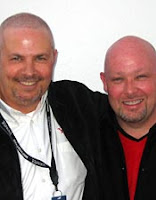The talking heads on television sometimes forget how they got there.
In a rapidly changing world of sports media, where the written word has taken a back seat to the shouted one, many sportswriters have become so enchanted with their own likeness that they’ve forgotten one of the cardinal rules of journalism: No one cares about you.
Readers care about the athletes you cover, the thrilling games you’ve seen, the back-room arguments you’ve witnessed, the secrets you know. Readers depend on you to use your inch-count to dish about the athletes, not about yourself.
In my opinion, there has been just one man that has mastered the art of writing about himself and making people consistently care: Rick Reilly.
My point is that there are rare occasions when the reporter becomes the story — usually in a negative, scandal-based news report.
But in this story, A survivor’s story, Yahoo’s Bob Margolis tells a story that breaks the above-mentioned cardinal rule and for good reason. In this case, readers do care about Margolis, whose writing is basic, but powerful.
Here is a portion of his first-person story: 
Several days after Johnson wrapped up his first title, I found myself in the office of Dr. Pat Toselli, the chief of surgery at St. Luke’s Hospital in Allentown, Pa., who, after examining me and looking at the test results, said, “This looks like it could be lymphoma.”
Lymphoma. Isn’t that cancer?
“Yes,” he said. “But, we’ll only know that for sure once I can remove the lump in your leg.”
Wait a minute. Cancer? Me? I’m never sick. I don’t even get colds. I’m a pretty healthy guy. Maybe a bit overweight. But, hey, most of us writers who travel the circuit are. It’s just a part of the deal when you travel as much as we do.
I don’t smoke. I take a handful of vitamins every day. Cancer? Are you sure?
The thought of having cancer took my breath away. Am I going to die?
My whole life began to change from the moment he said the word lymphoma.
My older sister had died three years earlier from lymphoma. All I could think about was seeing her lying in a hospital bed.
I didn’t want to die.
I was scared.
How do you tell your children you’re sick and, worse, it might be cancer? When I did, we all cried.
I kept telling them that everything would be alright, even though I knew it might not be.



 Posted by Steve Klein
Posted by Steve Klein





